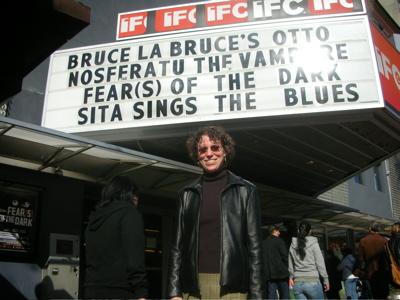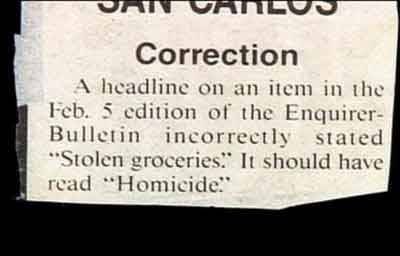That’s all I know so far – a multiple-shows-a-day run of Sita Sings the Blues at New York’s IFC Film Center, starting Dec. 25 (aka “Chrismas) and closing Dec. 31 (aka “New Year’s Eve”). More info like exact screening times and how to buy tickets coming soon. Mark your calendars! Tell your friends! Help us promote it! I love you!
Evelien Lohbeck
More of this artist’s really cool short films here. Via Ken Shan.
What’s stopping you?
 “What’s stopping ME from selling ‘Sita’ DVDs and merch?” I usually get this question from slightly shocked artists and filmmakers after Sita Sings the Blues talks. I’m not stopping them, and the law isn’t stopping them. Yet for some reason, they don’t go out and sell Sita merch once they know this. Why?
“What’s stopping ME from selling ‘Sita’ DVDs and merch?” I usually get this question from slightly shocked artists and filmmakers after Sita Sings the Blues talks. I’m not stopping them, and the law isn’t stopping them. Yet for some reason, they don’t go out and sell Sita merch once they know this. Why?
I can guess the answer, of course:
expensive
big hassle
DVDs & merch already exist & are available
insufficient incentive to compete
have other, more important things to do
When one artist-filmmaker I know well asked the question, I boldly answered, “nothing – but you won’t.” I know she won’t because she has enough trouble merchandising and promoting her own work; and she’s a good artist, so I know she’ll remain more devoted to her own work than to mine.
That said, a few people (other than me and my Endorsed distributors) are selling Sita merch. One such is Drakar, who also distributed Sita on youtube and elsewhere online. He recently created a small CafePress online shop.
He didn’t ask for my permission or Endorsement*, but states, “This shop is not run by Nina but I will be giving her a significant portion of any profits I might make here (…if and when).” I actually prefer that to negotiating an Endorsement for small-scale projects, because it requires no lawyers or signed contracts. For small amounts of money, who wants to waste any of it on transaction costs?
*Full disclosure: he did email me for some design artwork he couldn’t find online, which I supplied, so the store wasn’t a complete surprise.
In general, I would much prefer you bought Sita merch from the Sita Merch Empire than from a CafePress store. Reasons include: I know the Merch Empire merch is high quality, I personally designed and like all the products there, and a much higher % of the money goes to me. CafePress merch tends to be overpriced for the quality, and CafePress takes almost all the profits unless the seller sets prices absurdly high.
That said, Drakar’s store offers Sita merch that doesn’t exist at the Merch Empire. If I offered mugs, mousepads and stickers, he wouldn’t have needed to make a Cafe Press store in the first place. If he actually sells any, it will demonstrate there is demand for such products. Then I can offer the same or similar products at my store. Drakar is essentially providing free market research, as are any other “competitors.” If any of them do exceptionally well, I’ll know what merch I should be selling.
This is why old-school economists say competition is good for businesses. It is. Too bad there’s so little real competition in our supposedly “free market democracy”.
What’s stopping you from selling ‘Sita’ merch? Not me, and not the law. Yet almost no one’s doing it. Why? What really is stopping you?
I <3 Middlemen
Yes I do! Most indie filmmakers I talk to complain about distributors and “middlemen,” but they’re missing the real problem. Middlemen – publishers, distributors, resellers – can do excellent work. The problem is not middlemen; it’s monopolies.
So many middlemen insist on monopolies, we’ve forgotten we don’t need to grant them. They say that without a monopoly (aka “exclusive rights”) they have no incentive to promote and distribute. Actually a monopoly gives a middleman no incentive, because no one is competing with them. Take away the monopoly, and the middleman has to compete with other potential middlemen (including the artist). Then they have an incentive to work. Rather than monopoly, they succeed on the basis of expertise (theatrical distributors already know how to track, ship, and manage prints), innovation (finding better ways to meet customers’ existing desires and identifying new ones), and quality.
I’m very happy with the middlemen I work with. FilmKaravan, who distributes Sita Sings the Blues on DVD, promoted and placed DVDs in outlets and markets I was too lazy to reach. (They out-competed me, which is great!) GKids, who distributes the film theatrically East of the Mississippi, manages the prints professionally, finds great new venues for it, and promotes it cleverly without overspending. These middlemen do their jobs very well, and I’m grateful for the services and value they add to the film. They have my non-exclusive Endorsement.
I’m only unhappy with one middleman, an overseas distributor who uses their monopoly to block access to the film rather than facilitate it. For example, a professional conference held by their country’s national television company, and attended by important players in the film industry there, sought a one-time conference screening of Sita, but the distributor refused to lend the local print. Lending it would have helped the film tremendously, but the distributor was focused on immediate money instead of on the long-term good of the film. Because I had foolishly granted this distributor an “exclusive endorsement” in their territory, there was no one else in a position to lend a print. (What distributor would take up a film knowing that the filmmakers’ imprimatur had already been granted to a competitor?)
My endorsement wasn’t a mistake. I want that distributor to make money, and lots of it. But endorsing exclusively was a mistake: although not as bad as copyright, it’s still a kind of monopoly, and monopolies invite abuse. That is their nature. I now know that to get good work from a middleman, I can’t grant them a monopoly. They need to feel that if they let an opportunity slip by, another middleman may jump at it. Business competition improves business performance; some say it’s an essential incentive.
Middlemen will only have monopolies if artists keep granting them. They’re not going to give them up on their own. It falls on us artists to simply refuse to grant these monopolies in the first place. A copyleft license sends a clear, simple, and non-negotiable message to middlemen that they need to innovate and compete to profit from the work. Only we artists can supply the incentives they need to do their jobs well; and we can only do that by refusing monopolies.
A middleman without a monopoly is a great help to art and artists. Rather than abusing monopolies, they provide valuable services. The better they are at providing services, the more successful they become. Competition keeps middlemen on their toes, and eliminates the lazy and incompetent. Monopoly does the opposite.
In sum, the problem isn’t middlemen, it’s monopolies. Yay for middlemen! I <3 U.
Frunch: the Free Culture Lunch, #2
This Friday, December 11, 2 pm, Soy & Sake @ 47 7th Ave S (at Commerce St) in New York’s West Village. Open to anyone who is into Free Culture, Free Software, Free Speech, Intellectual Freedom, anti-censorship, etc.
I’m trying to build another Free Culture community in New York. Last week’s was a lot of fun. Hopefully we can do this every Friday.
Correction, again
I’m reposting this because misinformation continues to spread all over the interwebs. Maybe I’ll post it every month.
Dear Journalists Dear Journalists, bloggers, commenters, etc.,
Some of you are writing that I was forced to choose the Creative Commons Attribution Share Alike license because the film is violating copyright. That is completely untrue, but has become the dominant motif of stories I read about the project. The confusion is understandable, so I attempt to sort it out below.
Sita Sings the Blues is 100% legal. I am free to release it commercially, which is why the film is gaining a number of commercial distributors in addition to its free sharing/audience distribution, which is also legal, and wonderful.
Sita Sings the Blues is in complete compliance with copyright regulations. I was forced to pay $50,000 in license fees and another $20,000 in legal costs to make it so. That is why I am in debt. My compliance with copyright law is by no means an endorsement of it. Being $70,000 in the hole reminds me daily what an ass the law is. The film is legal, and that legality gives me a higher moral ground to stamp my feet upon as I denounce the failure that is copyright.
Having paid these extortionate fees, I could have gone with conventional distribution, and was invited to. I chose to free the film because I could see that would be most beneficial to me, my film, and culture at large. A CC-SA license does not absolve a creator of compliance with copyright law. The law could have sent me to prison for non-commercial copyright infringement. I was forced to borrow $70,000 to decriminalize my film, regardless of how I chose to release it.
Note that in some ways the film is not, and never will be free. For each disc sold, distributors must pay $1.65 to these faceless money sinks. Transaction costs raise that amount to about $2.00 per disc. That is why my own Artist’s Edition is limited to 4,999 copies. I’ve already bled $50,000 into their vampiric maws; I have no intention of paying more.
Thank you for your attention.
Love,
–Nina



